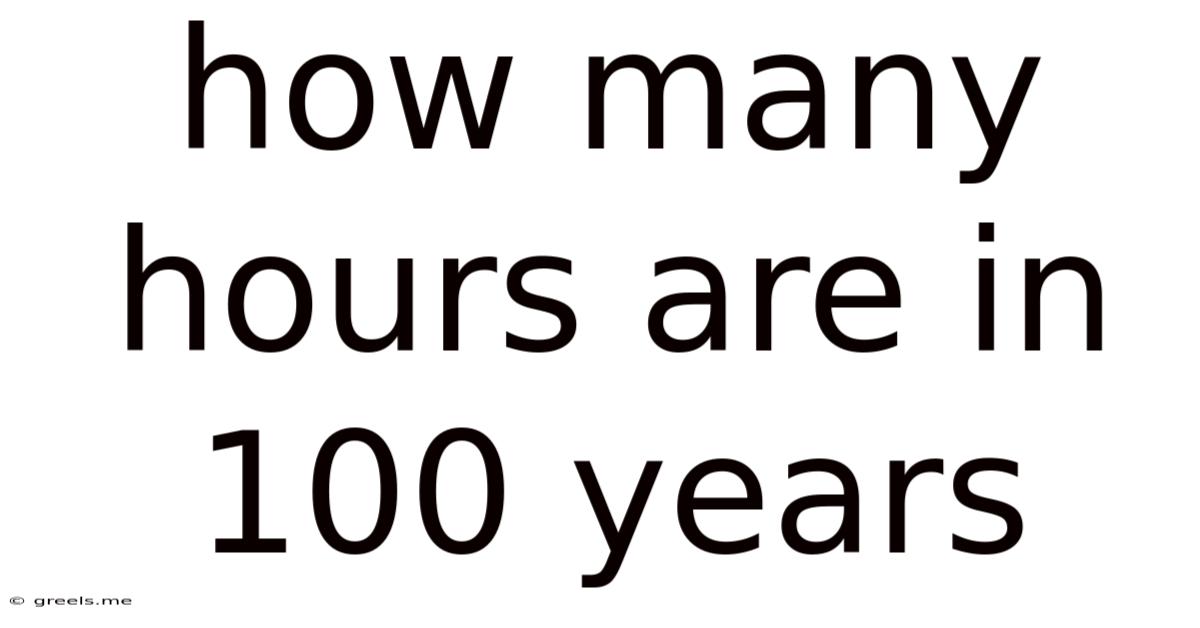How Many Hours Are In 100 Years
Greels
May 22, 2025 · 5 min read

Table of Contents
How Many Hours Are in 100 Years? A Deep Dive into Time Calculation
The question, "How many hours are in 100 years?" might seem simple at first glance. However, delving into the intricacies of time calculation reveals a fascinating exploration of calendars, leap years, and the very nature of timekeeping. This article will not only answer the primary question but also provide a comprehensive understanding of the complexities involved.
Understanding the Basics: Days, Years, and Leap Years
Before we embark on our calculation, let's establish the fundamental building blocks:
- Days: A day is generally defined as a 24-hour period. This is based on the Earth's rotation on its axis.
- Years: A year is the time it takes for the Earth to complete one orbit around the Sun. This is approximately 365 days.
- Leap Years: Because the Earth's orbit isn't exactly 365 days, an extra day is added every four years to correct the discrepancy. This is known as a leap year, and it contains 366 days. However, there are exceptions to this rule. Years divisible by 100 are not leap years unless they are also divisible by 400. This is why the year 1900 was not a leap year, but 2000 was.
The Calculation: A Step-by-Step Approach
To accurately calculate the number of hours in 100 years, we need to account for the presence of leap years within that century. A straightforward approach isn't feasible because of the irregular occurrence of leap years. Let's break down the process:
-
Average Number of Days per Year: Over a long period, the average number of days in a year is slightly more than 365. To find this average, we can consider a 400-year cycle (the time it takes for the Gregorian calendar to repeat itself). In a 400-year cycle, there are 97 leap years and 303 non-leap years. Therefore, the average number of days per year is (97 * 366 + 303 * 365) / 400 ≈ 365.2425 days.
-
Number of Days in 100 Years: Using the average number of days per year, we can estimate the number of days in 100 years: 100 years * 365.2425 days/year ≈ 36524.25 days.
-
Number of Hours in 100 Years: Finally, we can convert this number of days into hours: 36524.25 days * 24 hours/day ≈ 876582 hours.
Therefore, there are approximately 876,582 hours in 100 years. This is an approximation because the actual number will vary slightly depending on the specific 100-year period considered due to the complexities of the calendar.
Exploring the Discrepancies: Why the Approximation?
The answer above is an approximation because:
- The Gregorian Calendar: The Gregorian calendar, which is the most widely used calendar system globally, is an approximation itself. While it strives for accuracy in aligning with the Earth's orbit, it still introduces slight discrepancies over long periods.
- Leap Year Rules: The rules governing leap years are complex, and the exceptions create variations in the number of days per century. A simple multiplication by 365 would significantly underestimate the actual number of days.
The Significance of Precision in Timekeeping
The precision of timekeeping is crucial in various fields:
- Scientific Research: Accurate timekeeping is essential for experiments, data analysis, and synchronization of various systems in scientific research. The slight variations in the number of days per year might seem negligible, but they accumulate over time and impact the accuracy of long-term observations and experiments.
- Navigation: Accurate time is crucial for GPS and other navigational systems. The slightest inaccuracies can significantly affect positioning and navigation, especially over long distances.
- Finance: Accurate timekeeping is critical in financial markets to record transactions, settle trades, and ensure the integrity of financial operations.
- Astronomy: Precise timekeeping is essential in astronomy for studying celestial movements, predicting astronomical events, and calibrating astronomical instruments.
Beyond the Calculation: The Philosophical Implications of Time
The calculation of the number of hours in 100 years prompts reflection on the nature of time itself:
- Subjectivity of Time: While we can mathematically calculate the number of hours, our experience of time is highly subjective. Time can feel slow or fast depending on our emotional state and the activities we are engaged in. The objective measurement of time contrasts sharply with the subjective experience of it.
- The Relativity of Time: Einstein's theory of relativity reveals that time is not absolute but relative to the observer's frame of reference. The speed of an object and its gravitational field can affect the passage of time. This concept adds another layer of complexity to the simple calculation we performed.
- Time as a Resource: The calculation emphasizes the finite nature of time. It is a precious and non-renewable resource. Understanding this finitude can encourage us to value and utilize our time more effectively.
Conclusion: More Than Just Numbers
The seemingly straightforward question of "how many hours are in 100 years?" leads us down a path of exploration encompassing scientific principles, historical context, and philosophical considerations. While the approximate answer is 876,582 hours, the true value lies in the understanding of the complexities and implications of time itself, its measurement, and its significance in various aspects of human life. The detailed analysis provided above not only answers the original question but also enriches our comprehension of time's intricacies. This understanding allows for a deeper appreciation of the precision involved in timekeeping and its impact on various fields of study and everyday life. The subjective experience of time, often at odds with its objective measurement, remains a captivating topic for contemplation.
Latest Posts
Related Post
Thank you for visiting our website which covers about How Many Hours Are In 100 Years . We hope the information provided has been useful to you. Feel free to contact us if you have any questions or need further assistance. See you next time and don't miss to bookmark.